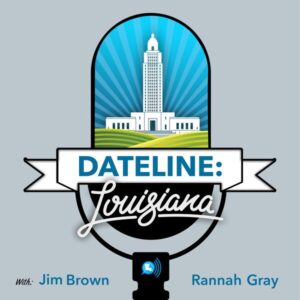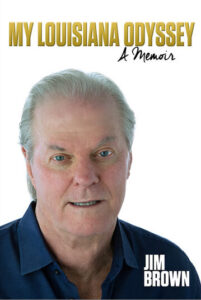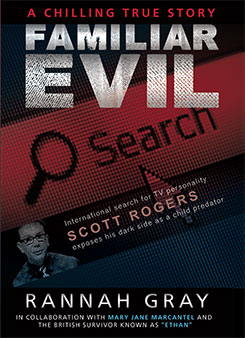Frequently Asked Questions
Q: What motivated Jim Brown to write a book about all that happened to him?
A: Jim has written down anecdotes, family happenings, and observations about his various activities for years. He has always kept an extensive diary. He started writing editorials at the University of North Carolina and has written for numerous pamphlets, booklets, and studies during his time in public life as State Senator, Secretary of State, and Commissioner of Insurance. He has written lengthy outlines of Louisiana history when he taught this course at both Tulane and Louisiana State University.He kept extensive notes and a box full of clippings during his trial, so he had on hand many specifics on which to build. While he was undertaking his appeal, he used his time to sit down each day for three to four hours and put together the outlines of his new book. Those who have read it are amazed at the specific detail, legal citations, and Jim’s overall grasp of just what happened during the whole legal proceedings.The book was important for him to tell his side of the story and let the world know how unfairly he was treated. He knew his situation was unique, where no public official had ever been treated in such an unjust matter. Jim wanted to document in some detail, so that future elected officials, attorneys, and those in business could learn both the overwhelming power of the federal government, and how unjust their actions could be.
Q: I enjoy reading Jim’s columns each week. Where does he get all of his ideas?
A: Jim observes the world around him like all of us do. As he reads the papers, watches events on television and the movies he is always thinking how the facts at hand may be turned in to written comments that give out fresh information, have some humor, and how he can make it personal so the reader relates to what he writes. All of us are amazed at the response to his columns. He often receives two to three hundred emails with readers wanting to give their “slant” on Jim’s opinion of the day. Sometimes this take a while, but he makes it a point to personally answer every email that comes in.
Q: What�s Jim Brown have planned for the future?
A: Being away from public life has given Jim a different perspective. He doesn’t have to be guarded, and he can be more candid in what he believes or what his impressions might be. He can also be wittier and perhaps a bit sarcastic from time to time.
Jim is giving speeches both throughout the state and country. Recently, he talked to groups in Lake Tahoe and South Carolina and has a busy schedule in the months ahead. His speeches involve financial issues using his background as Insurance Commissioner, and he talks about the dangers to the people in the business community in dealing with the federal government.
Jim also receives thirty to forty press inquiries a week wanting his opinion about important issues facing the state and nation. So being away from public life has given him a different perspective, a chance to make his point of view known and perhaps, in a small way, influence the agenda of important issues at both the state and national level.
For the time being, Jim will continue to write his column that appears on this site every Thursday. His weekly column also appears in numerous newspapers throughout Louisiana. He is already moving towards a new book project involving his “Six-Month Vacation” at Oakdale Penitentiary. If all goes as planned, he should have a new book out in the fall of 2005.
In addition, he is on the golf course three to four times a week, generally with his son, James, trying is best (like all of us) to keep his weight down by working out regularly, and enjoying the success of his three daughters as well as his son.
A: It’s obvious now that the notes have finally been made public. They dramatically differ from the testimony that Burton gave at the trial. The notes would have been of great help to Jim Brown’s defense. Otherwise, why would the prosecutors have worked so long and hard to keep Brown from getting these notes?
A comparison with another defendant in the Cascade case, Ron Weems, shows what a great disadvantage Jim Brown had at the trial. Co-defendant Ron Weems was given the notes of his interview with Harry Burton. Weems used these notes effectively in cross-examining Burton, and the notes were significantly different than what Burton typed up in his final report. The notes were a great help to Weems, and certainly would have been of even greater help to Jim Brown. There is overwhelming agreement by any neutral party who has looked at the notes and reviewed Burton’s testimony that the handwritten notes of Burton would have set Jim Brown free.
Q: Has there ever been a case in any federal court in America where someone was accused of making false statements to the FBI, or convicted of making these false statements, but were not given the handwritten notes of the FBI agent?
A: As Brown’s lawyer, Bill Jeffress, will argue before the U.S Supreme Court: “There has never been a reported case when a defendant accused of false statements was denied access to the FBI’s contemporaneous record of the alleged false statements, much less a case where the defendant was denied the opportunity to confront the testifying agent with his own notes, or to ask him any questions about the content of those notes.”
We are hopeful that since there has never been a case similar to Jim Brown’s, and he was so prejudiced by not receiving these handwritten notes, the U.S Supreme Court will hear his case. What happened to Jim Brown has not happened to any defendant any place else in the country in any federal court.
Q: Would the notes really have made any difference?
A: Judge for yourself. In every charge of which Jim Brown was convicted, there is nothing in the notes that support the testimony of the FBI agent at the trial. The following are typical examples:
Remember that the notes were detailed, and 11 pages long. In virtually every false statement charge, the information given by the FBI agent in his typewritten statement and on the witness stand are found nowhere in the detailed notes.
Jim Brown’s attorney charged at the trial that the FBI agent “manufactured the false statement against him.” It’s obvious from the handwritten notes that this is the case. If Jim Brown would have had the handwritten notes of the FBI agent, his attorney, Bill Jeffress, would have aggressively pointed out the discrepancies, and these notes would have been devastating to the prosecution. Simply put, the notes would have set Jim Brown free.
Q: What about other witnesses who could talk about the problems the FBI agent had in taking notes in other cases, as well as other investigative mistakes?
A: There were several key witnesses Jim Brown tried to call in his defense. One was a former FBI agent, as well as a Baton Rouge attorney, both who testified about the questionable tactics of the FBI agent who interviewed Jim Brown. Unfortunately, the trial judge would not let any of these witnesses take the stand and testify about the numerous mistakes often made by the FBI agent.
Q: Why does Jim Brown say his Sixth Amendment Constitutional rights were violated?
A: Jim Brown was denied the opportunity to confront the FBI agent about what he wrote down in his own notes. In other words, he could not even question him about what he had written down on paper, or ask the FBI agent any questions about any content of the notes. The Sixth Amendment guarantees a defendant the right to confront his accuser. Again, there has never been a reported case in any federal court in the country where a defendant was not able to cross examine his accuser about what was written down or what was not written down.
Q: Jim Brown was under a gag order right after his indictment and through his entire trial process. Is this normal in cases involving public officials?
A: Gag orders are almost never issued in cases like Jim Brown’s. The gag order in this case was criticized by the Baton Rouge Advocate, as they said: “We believe the First Amendment gets short shrift in many cases where gag orders are issued.”
Q: Why was there so much secrecy surrounding the Cascade trial?
A: There have rarely been so many restrictions put on a defendant as was done in the Cascade matter. Columnist John Copes, in his daily Deductbox column, summed it up in the following manner: “There is something un-American and sneaky about this whole process of secret trials, anonymous juries, sealed evidence, sealed motions, and iron-fisted information management in what is purported to be a system of public justice. The public still doesn’t know why the government asked for and the judge granted an anonymous jury in the last trial.”


A provocative look at the deepest of the deep southern states by two veterans of Louisiana politics. Thoughts that are informative, candid, humorous, and sometimes controversial about life in one of the most interesting and rabble-rousing states in the nation.





